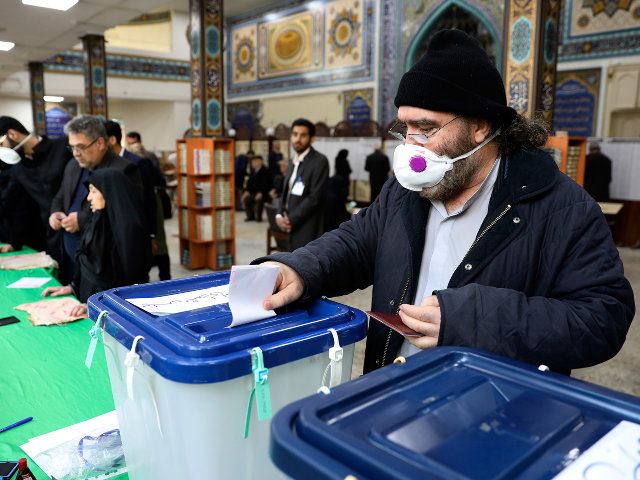Iran blamed “negative propaganda” on Sunday regarding a growing outbreak of Chinese coronavirus in the country for the success of a national boycott which yielded the lowest voter turnout in the history of the Islamic Republic.
Iran held parliamentary elections on Friday and urged a high turnout as a “slap in the face” to America. Supreme Leader Ayatollah Ali Khamenei banned thousands of people from running for open seats, as he typically does, for being insufficiently loyal to him. Only candidates who vow to bolster the current repressive regime can appear on ballots.
According to Iranian Interior Minister Abdolreza Rahmani Fazli, who revealed the results of the election on Sunday, 24 million out of 58 million registered voters went to the polls on Friday, about 42.5 percent. This is the lowest number of voters since the 1979 Islamic Revolution, something Rahmani Fazli insisted was “quite acceptable” given growing concerns that Tehran has no control over the spread of the novel Wuhan coronavirus in the country, a virus considered highly contagious even among patients showing no symptoms.
Rahmani Fazli also obliquely noted the growing tide of resentment against the regime by citing “the political circumstances such as the downing of a Ukrainian passenger plane in Tehran” as a reason for the low turnout. The Iranian government shot a Ukrainian airliner out of the sky in January, allegedly a mistake occurring while Iran shot over a dozen ballistic missiles at American targets in Iraq. The hundreds of deaths Iran’s military caused triggered widespread protests against the regime, which Rahmani Fazli of course dubbed “riots.” The interior minister attempted to claim that fear of being caught in a violent opposition assembly, not participating in a boycott, is what kept voters at home.
Addressing the country on Sunday, Khamenei himself dispelled growing concerns about coronavirus as a propaganda campaign to hurt the regime.
“This negative campaign started a few months ago and intensified closer to the elections, and in the last two days [up to the election day], their media outlets did not miss the slightest opportunity to discourage people from voting under the pretext of a disease and a virus,” the state propaganda outlet PressTV quoted Khamenei as saying. “In the face of thousands on the enemy front acting against Iran on various issues, millions of people must be ready on the Iranian nation’s front to defend, strike and counter-attack in propaganda fields and all sorts of things possible for the nation.”
Khamenei claimed the record-low turnout was “satisfactory.”
Khamenei manipulated the vote so that “hardliners,” the term used for radical Islamists who openly support the violence of the Iranian Revolution, won a “decisive” vote against the “reformers” who believe the same things as the “hardliners,” but use softer language. Many of the big winners announced are either members of the Islamic Revolutionary Guard Corps (IRGC) or related to senior members. The man considered the likeliest candidate for speaker of the parliament, Mohammad Bagher Qalibaf, is a brigadier general in the IRGC.
The IRGC is a U.S.-designated terrorist organization.
Iranians who oppose the regime called on a national boycott of the elections, a way to demand free and fair elections in which the government did not stifle opposition voices. The People’s Mujahedin of Iran (MEK), an anti-regime activist organization, published multiple videos of seeming abandoned polling stations in some of the most populated areas of the country, including Tehran. Members operating secretly in the country also recorded what they described as footage of Iranian regime officials bribing people to vote.
Maryam Rajavi, the President-elect of the National Council of Resistance of Iran (NCRI), also accused the regime of hiding the extent of the coronavirus outbreak in the country specifically to prevent potential voters from staying home, fearing a potential infection caught among large crowds of voters.
“She said the mullahs’ regime had been aware of the spread of the virus to Iran long time ago. But on the order of the regime’s Supreme Leader Ali Khamenei, it resorted to a cover-up to ensure a high turnout for the anniversary of the 1979 revolution and the sham election,” the NCRI said in a press statement. “The virus rapidly spread to different parts of Iran because people were kept in dark.”
Iranian lawmaker Ahmad Amirabadi Farhani similarly accused Tehran on Monday of hiding the extent of the outbreak. Amirabadi, who represents the most affected city by the outbreak so far, Qoms, claimed that 50 people had died of coronavirus as of Monday and that the government had quarantined 250 people locally. Reports suggested that Amirabadi himself was suffering from fever and other symptoms indicative of a coronavirus infection when told to leave the parliament last week.
As of Monday, Iranian regime officials say only 12 people have died after testing positive for the virus and that the government has identified 47 cases.
The regime has not revealed the source of the outbreak in the country or how it came to Iran from China. Nor has it indicated that it has identified the patient responsible for first bringing it to the country.

COMMENTS
Please let us know if you're having issues with commenting.